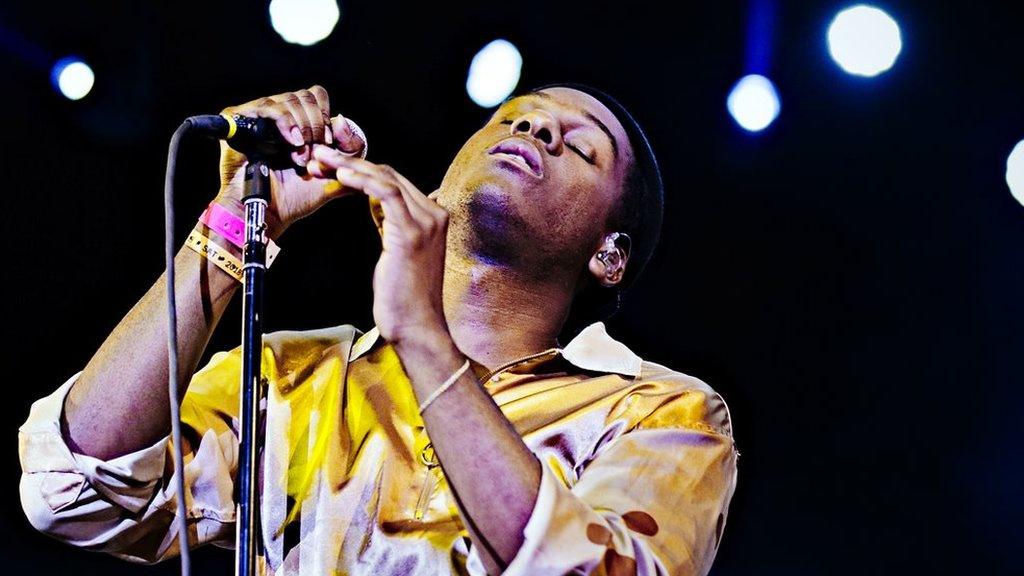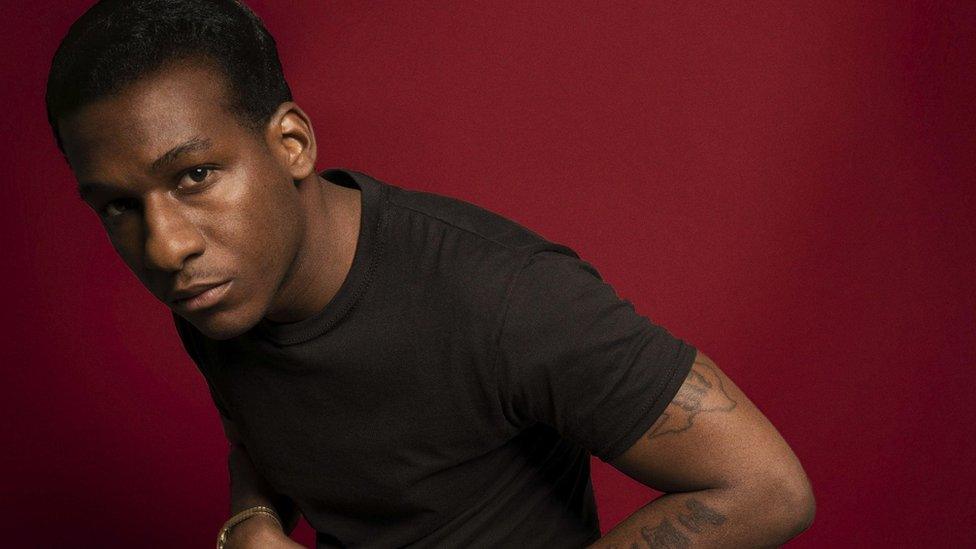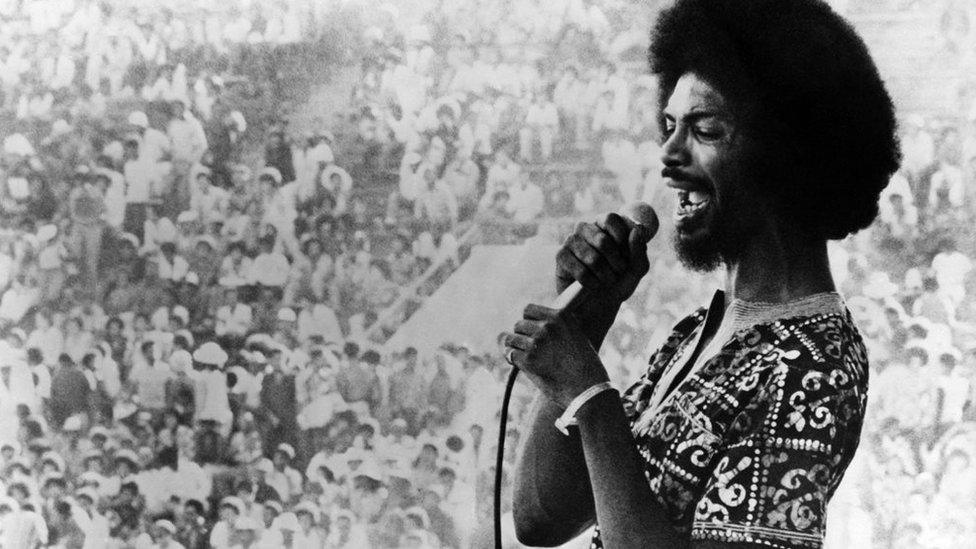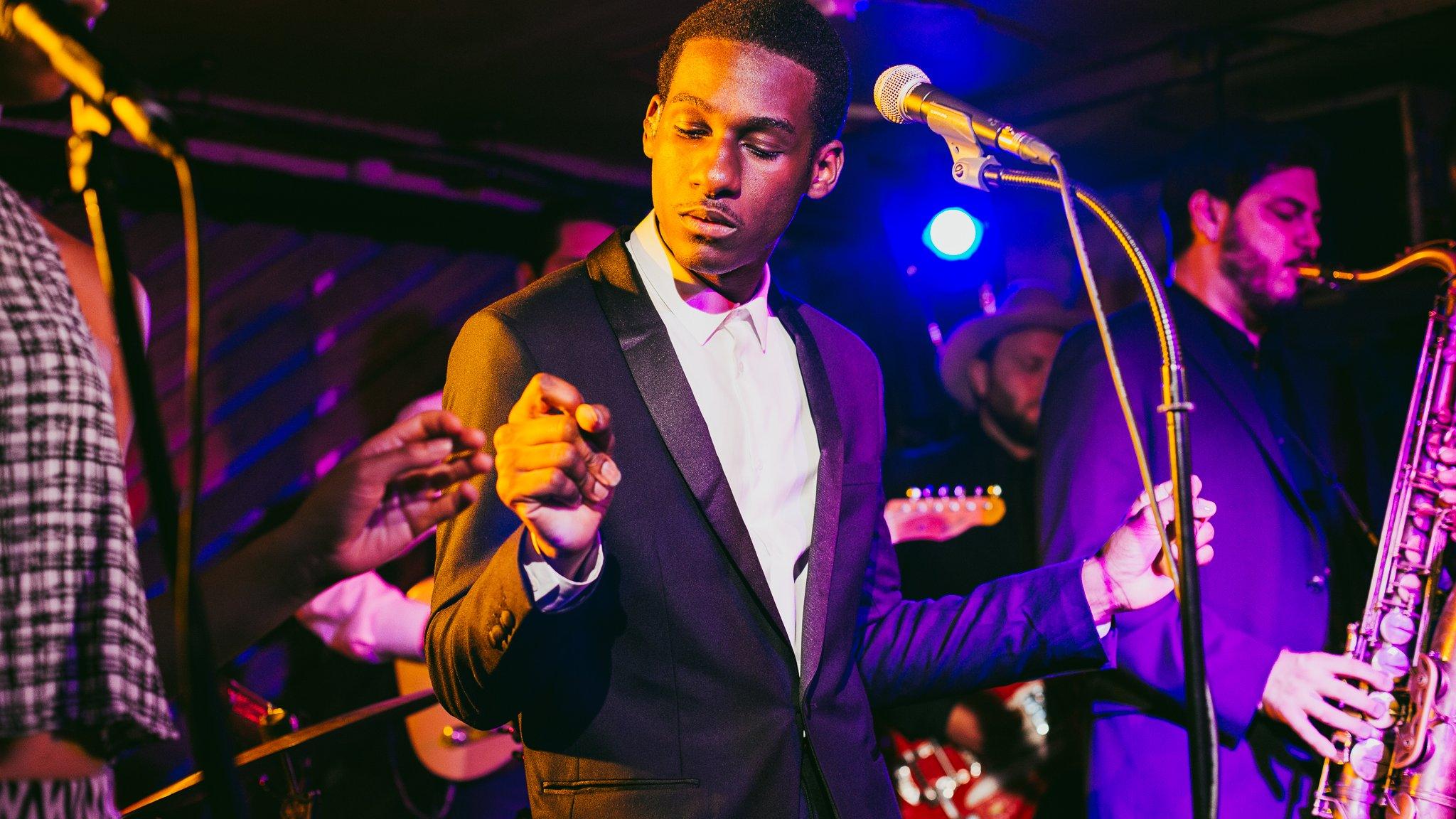Leon Bridges: 'America wasn't designed for people of colour to succeed'
- Published

Bridges has been likened to artists including Sam Cooke, Curtis Mayfield and Bruno Mars
With his first album Coming Home, Leon Bridges went from washing dishes in Texas to playing for President Obama at the White House.
The singer's ability to channel the smooth soul sounds of the 60s earned him comparisons to Sam Cooke and Marvin Gaye, not to mention multiple Grammy nominations and a sought-after spot on the soundtrack to Big Little Lies.
But, even as he shared stages with Paul McCartney and Stevie Wonder, a question mark hovered over the 28-year-old: Was he a musician in his own right, or simply a skilful mimic?
He provides answers - lots of them - on the recently-released follow-up, Good Thing, which expands his sound in multiple directions, without losing the romanticism of his debut.
The star admits he struggled to make it happen, though.
"It wanted to change the sound but, honestly, when I started writing I felt like I hadn't found it yet," he tells the BBC.
It was only when he brought in producer Ricky Reed (Kesha, Halsey, Twenty One Pilots) that things turned a corner.

The singer was raised in Fort Worth, Texas
Reed pushed Bridges and his four-piece band out of their comfort zone, particularly on the opening track - Bet Ain't Worth The Hand - where Bridges' reveals an affectingly mournful falsetto.
"I never loved my falsetto, I never thought it was strong," says the singer. "But Ricky encouraged me to go to those places and it's really cool."
That said, he's not so keen on playing the song live - placing it at the start of his set to get those high notes out of the way.
"It was fun recording it but I hate that song now!" he laughs. "Honestly, singing in that register every night is rough."
He's more comfortable with the warm baritone he employs on Shy; or the staccato vocal flips of the Bruno Mars-like You Don't Know.
But perhaps his best vocal performance is on the sinuous Bad Bad News, with a call-and-response chorus that claps back at his critics.
"I hit 'em with the style and grace, and watch their ankles break," he sings over a laid-back soul-jazz groove.
Allow YouTube content?
This article contains content provided by Google YouTube. We ask for your permission before anything is loaded, as they may be using cookies and other technologies. You may want to read Google’s cookie policy, external and privacy policy, external before accepting. To view this content choose ‘accept and continue’.
The song is a response to "people who've told me personally that I couldn't do anything with music," the singer tells the BBC.
"In America, I feel that the system wasn't designed for people of colour to succeed," he says. "So it's a song of victory. [I'm] making something great out of nothing."
It's a rare diversion into politics for the 28-year-old; a fact he's keenly aware of.
"I want to use my platform to speak on race and the problems within the world and within America," he explains, "but it's hard for me personally to put that in a song and make it poetic.
"I feel a lot of pressure to make political music. But at the base of it, I want it to be a good song and not just rush and make something political for the sake of it."
Cutting room floor
Maybe he could take some pointers from Gil Scott-Heron, the revolutionary poet who was best-known for The Revolution Will Not Be Televised - a biting, spoken-word screed against consumer culture that became an anthem of the 1970s black power movement.
Bridges played Scott-Heron in the Neil Armstrong biopic First Man, external - delivering a faithful version of the polemic Whitey On The Moon, which asked why America had millions of dollars to pour into space exploration while millions of African-Americans lived in poverty.
"I listened to that recording over and over again and got some of his inflections," he says of his preparation for the role.
"I could have turned the song into something soulful but I wanted to keep it true to him."

Gil Scott-Heron was critical of the money spent on the space mission
When we speak in July, however, Bridges confesses, "I actually don't know if my scene made it".
Sure enough, director Damien Chazelle (Whiplash, La La Land) eventually dialled back the film's politics - so the performance, originally part of a "protest scene", ends up as a brief soundbite.
But the experience has whet Bridges' appetite for further acting roles.
"If I had the chance, I'd love to play Bobby Womack," he says.
"I'm just fascinated with him and his story and his career and his musicianship. I really love his rendition of Fly Me To The Moon, external."
Rebel threads
But Bridges isn't just a scholar of music. He's also a classicist when it comes to dance, having studied ballet, modern, African, and jazz techniques at college - which explains the supple fluidity of his moves in his latest video, If It Feels Good (Then It Must Be).
Even his dapper, clean-cut style is indebted to the past - although from a more surprising source than you might imagine.
"Man, I always loved style. Even when I was a kid," he says.
"But what really sparked my love for this type of fashion was seeing a photo of a group called The Dapper Rebels, external, which was a couple of gangsters around the time of the Watts Riots in California.
"There are some amazing photos of these guys dressed to the nines. And those photos inspired me, because I'd never seen black men dressed in that way, and I wanted to incorporate it into my own style."
Those threads show how far he's come from the kid wearing his "brother's hand-me-down clothes," as he sings on Georgia To Texas.
Allow YouTube content?
This article contains content provided by Google YouTube. We ask for your permission before anything is loaded, as they may be using cookies and other technologies. You may want to read Google’s cookie policy, external and privacy policy, external before accepting. To view this content choose ‘accept and continue’.
He credits his hospital administrator mother, Lisa Sawyer, with keeping the family afloat - both mentally and financially - as he grew up; and says one of his proudest moments was paying off her debt after his first album hit the charts.
To keep her close, he's had her name tattooed on his right forearm; while he wrote a gorgeous doo-wop song about her, also called Lisa Sawyer, on his debut album.
"I could write a billion songs that could never repay her for the sacrifices she made for me and my siblings," he says.
"She initially wanted to be a singer, so it's kind of cool for me to fulfil her dreams."
And will she ever get to appear on one of his albums?
"Haha! She's always asking me about getting on a song but not yet..."
Given the trajectory of Bridges' career, there's still plenty of time.

Follow us on Facebook, external, on Twitter @BBCNewsEnts, external, or on Instagram at bbcnewsents, external. If you have a story suggestion email entertainment.news@bbc.co.uk, external.

- Published22 July 2015
